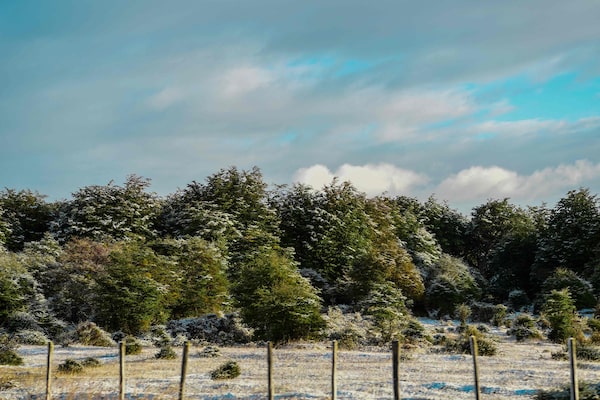
Snowy native forests in Pampa Guanaco in Tierra del Fuego, Chile, on March 11, 2021.MARTIN BERNETTI/AFP/Getty Images
The organizations that represent academic research within the Group of Seven nations have a message for world leaders: The same kind of scientific expertise that proved crucial to tackling the COVID-19 pandemic is also required to address a broader set of environmental and health challenges facing humanity.
In a joint communique released on Wednesday, science academies from each of the countries, including the Royal Society of Canada, call for urgent and co-ordinated action by their respective countries on three priority areas – climate change, biodiversity loss, and the need for better access to data during international health emergencies. (See communique in French here).
Expert panels, convened over the past several months, have produced recommendations in all three of the priority areas, aimed at driving discussions in June at the next meeting of leaders from the G7 club of economically developed countries.
“The G7 academies collectively represent a very powerful body of expertise,” said Sir Richard Catlow, foreign secretary and vice-president of Britain’s Royal Society, which led the effort. “What we hope is that these statements can really feed into the development of policy.”
He added that two key global meetings on climate and biodiversity scheduled for later this year offer another catalyst for scientists to speak up now, especially with the pandemic having so vividly demonstrated the essential role that data and expert advice can play in managing complex global problems.
While it is standard practice for the academies to provide input ahead of leaders’ talks, this year’s version of the exercise is a more concerted effort to put science on the agenda, academy representatives said. In part, this reflects a growing recognition that the most pressing global challenges require collective action. They cannot be solved by individual countries on their own and also cannot be solved separately from one another.
For example, climate change is intimately tied to the ecological upheavals driving biodiversity loss, while both have an impact on human health by affecting weather and food production or enabling the emergence of infectious diseases.
“I think that’s something that has been hammered home over the past year,” said Sharon Straus, a clinical epidemiologist and physician-in-chief at Toronto’s St. Michael’s Hospital, who was Canada’s representative on the health data expert panel. “We can’t be isolationists and think that what’s happening in one country is not going to happen here. ... It highlights why we have to work together.”
Among the health panel’s recommendations are adopting common principles and mechanisms to facilitate the sharing of data during health emergencies, as well as developing an understanding of how that data can be better used to improve a country’s response. The panel also called for the establishment of an international commission to draw on the lessons of the pandemic to improve data-sharing over the long term.
Meanwhile, a separate panel focused on recommendations for reversing biodiversity loss. These include the development of a better way to account for the value of nature while also reducing economic, social and health inequalities that result from its exploitation. Another recommendation calls for dramatically improving the monitoring to track changes in biodiversity worldwide.
“The geographic gaps in our data are so great that in most places in the world we can’t detect a change in a species or attribute that change to some cause,” said Andrew Gonzalez, a professor of conservation biology at Montreal’s McGill University who sat on the biodiversity expert panel.
Dr. Gonzalez added that what he most wanted to see emerge from the process was a “concrete commitment” to solutions and approaches that scientists have already identified.
For Mark Jaccard, an economist at Simon Fraser University in Burnaby, B.C., who is known for his work in sustainable energy and climate policy, the message to emerge from the panel he participated in – which focused on achieving net-zero emissions – should not come as a surprise to global leaders.
“We need strong policies to stop the open burning of coal, oil and natural gas,” he said. “These policies will increase innovation, and this should be augmented by collaborative efforts by G7 countries, bringing all countries into the process.”
Each of the participating science academies have shared the recommendations with their respective national governments. The recommendations and accompanying briefing documents are available to the public.
In a statement, Canada’s chief science adviser, Mona Nemer, said “the G7 science academies have addressed some of the most pressing issues for the future of our world. As they point out, taking on any of these challenges will require international co-operation, data sharing and evidence-based planning – necessities that the current pandemic has certainly underscored.”
Following the release of the recommendations, the next step is building awareness around the actions that scientists say are needed, said R. Paul Young, international secretary of the Royal Society of Canada, whose membership includes many of the country’s most distinguished scientists and scholars.
“The only way these problems are going to get solved is if we get traction ... not just from government, not just from scientists, but from the public,” Dr. Young said. “If the public doesn’t get behind this, then the politicians aren’t necessarily going to follow.”
Our Morning Update and Evening Update newsletters are written by Globe editors, giving you a concise summary of the day’s most important headlines. Sign up today.
 Ivan Semeniuk
Ivan Semeniuk